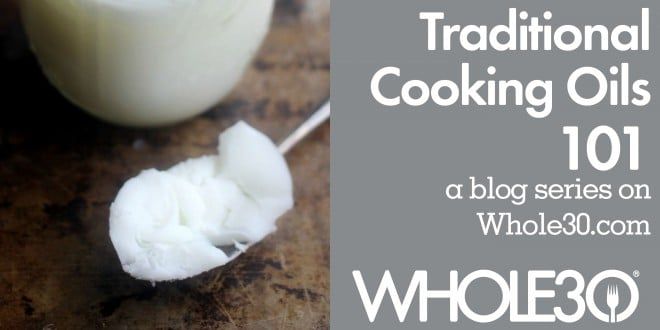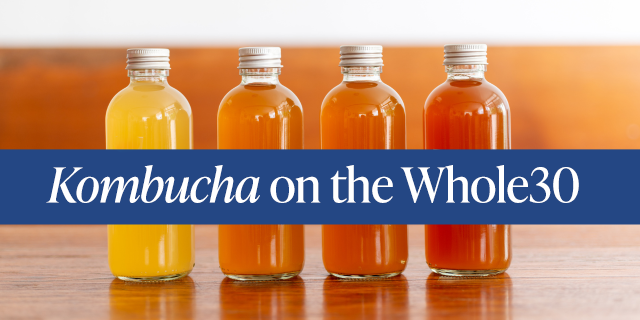This post is part of our Traditional Cooking Oils 101 series. To learn more about eating and cooking with animal oil, click here. You asked us all of your urgent animal oil questions, and we answered. Actually, we went straight to the source and asked fat-obsessed Defender of Fat David Cole of Fatworks to answer. Read on to satisfy your fat curiosity once and for all, and stay tuned for following installments of this series, where we share delicious Whole30 recipes cooked with Whole30 Approved Fatworks oils.
Your Fat Questions, Answered
Do animal cooking oils have a distinct flavor that will overpower the other ingredients in a dish? The majority of our oils are fairly neutral tasting. Beef Tallow is a little “beefy,” but rather than overpowering your dish, we think it imparts a unique and subtle flavor has been ignored for far too long. In fact, there is a dearth of recipes utilizing Beef Tallow, which we think is a shame and is something we’re working to rectify. (Do you have a fantastic recipe that calls for Beef Tallow? Feel free to send it to us and we’ll use it to spread the word about this delicious oil.) Chicken Schmaltz has a bit of a chicken broth flavor and odor, which is quite delicious. Leaf Lard has virtually no flavor or color, which makes it ideal for baking. Not that you do that on the Whole30, of course… Why should I use traditional cooking oils if I’m already cooking with ghee and coconut oil? Let me ask you a question in return: “Why do you need blueberries or apples if you already eat grapes?” It’s nice to have variety! Granted, fats don’t have the micro-nutrients that fruits have, so it’s not a perfect comparison but the concept is similar. At Fatworks, we love cooking with coconut oil and ghee, but a healthy diet includes a wide range of real foods. In fact, it was our desire to break out of the ghee-and-coconut-oil-cycle that led us on the path of fat in the first place. Does Fatworks source their products from ethically-raised animals? Fatworks was created specifically for those who are primarily concerned about food quality. We source our fat from independent small family farms. In fact, many of these farms are too small to be able to afford non-GMO certification, and they don’t need to because they usually sell their products at farmer’s markets and can answer customers’ questions and concerns face-to-face. All of the farms we work with have sworn affidavits stating that they do not use GMO feed and their animals are pasture-raised. We highly recommend that you avoid any animal fat that isn’t from a trusted source and make sure that your trusted source has a trusted source. Why is traditional cooking oil so expensive? We can only speak for our products, but the answer is directly related to animal sourcing and quality. Our uncompromising standards combined with our artisanal ethic result in a higher price tag. This is similar to companies that produce high-quality olive oil for $60 or more per liter. Editor’s note: to learn more about the Whole30’s perspective on oils, see page 97 of It Starts With Food. How long does animal oil last before going bad, and how should I store it? Each type of fat has its own shelf life, but as a general rule the higher the saturated fat, the longer the fat will last. Here are the recommendations we give for our products:
- Pasture Raised Duck Fat: Store in refrigerator. Duck fat will last about 4-6 months (but it rarely stays around that long).
- Pasture Raised Leaf Lard: Store in refrigerator. Lard will last 12-18 months in the fridge.
- Grass Fed Beef Tallow: Store in pantry. You can keep in the fridge but it will turn rock hard and then you will need to give it a hot water bath. Tallow is naturally shelf stable for years.
- Organic Free Range Chicken Schmaltz: Store in refrigerator. Chicken Schmaltz will last about 6 months.
You can also freeze your fats for a longer shelf life. Can you save and re-use the animal fat from your cooking? Yes, most of the traditional animal cooking oils are high in saturated fats, which protect the oil during high heat cooking. Another way to say this is that they don’t oxidize like many other oils and are good for repeated use. Just pour the fat through a coffee filter into a clean jar.Be careful not to burn yourself! (But, if you do ever have a kitchen accident, tallow makes a great all-natural burn cream.) Stay tuned for the next installments of our Traditional Cooking Oils 101 series, where we give you delicious recipes using some of the most popular Fatworks products.

















